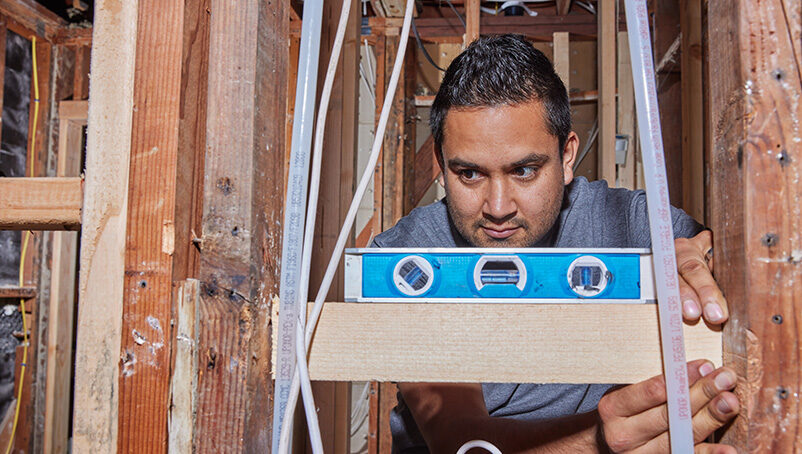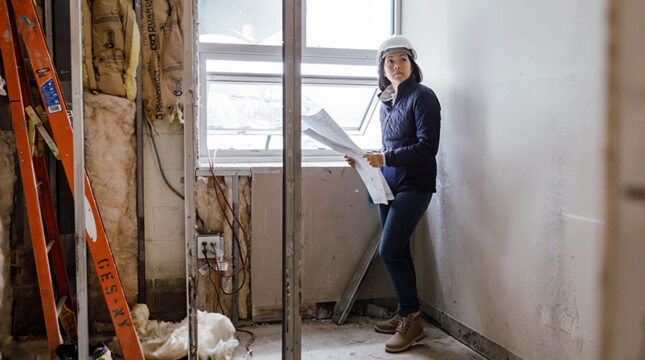Insurance for residential construction projects offers important protection for contractors if something unexpected happens. And many states won’t grant you a contractor license until you have it.
But how does residential contractor insurance work?
Here’s our guide to understanding this all-important safety net for your small business and how to choose the coverage that works best for you.
Why you need residential contractor insurance
Residential contractors work in situations where a lot of things can go wrong, both big and small. If that happens, your business insurance can help to cover financial losses.
In general, the construction industry is considered a high-hazard industry. There were over 16,000 nonfatal injury and illness cases involving days away from work in 2020, according to the Bureau of Labor.
Accidents can happen to the most conscientious professionals, especially when you’re working on someone else’s property where you don’t have complete control over the space.
While all professional contractors try to minimize risk, you can’t always reduce every risk to zero.
If you have coverage you trust, your business insurance can give you the peace of mind to focus on doing your best job. It also demonstrates to your customers that you'll have financial backup if something goes wrong.
What’s included in residential contractor insurance?
Different situations demand different kinds of coverage. You can customize your residential contractor business insurance package to fit your needs.
Here are a few important types of insurance residential contractors explore:
General liability insurance
General liability insurance (or commercial general liability) is the insurance coverage that many contractors buy first.
It helps cover costs if you or your employees cause an injury to someone other than an employee or damage property that doesn't belong to your business — two of the most common types of accidents that can happen on a residential job.
Let’s say you accidentally shatter a glass coffee table while taking measurements, or your customer trips over a power cable and gets hurt. In these situations, contractor general liability insurance might help replace the furniture or pay medical expenses up to your policy limits.
In many states, you must provide proof of general liability coverage in order to get a general contractor license. Clients might also have general liability insurance requirements before you can begin a job.
Professional liability insurance
Professional liability insurance is also known as contractors errors and omissions (E&O). It can help pay for alleged work oversights that cause a client financial loss.
While this kind of coverage can be less fundamental than general liability insurance, it can still make a big difference in protecting your contracting business.
For example, a client could claim you are responsible for construction project overruns. Whether it’s accurate or not, if someone says you didn’t deliver the services you said you’d provide, they can ask you to pay for any losses.
Professional liability insurance can help cover the costs and legal fees to defend your business or fix the problem.
Workers’ compensation insurance
If you’re a residential contractor who hires subcontractors like electricians and plumbers, you could be on the hook if one of your hires gets injured while working.
Workers’ comp makes those situations easier by helping with medical payments and treatment. It can also help cover lost wages while recuperating.
This coverage is required by law for businesses with employees in nearly every state. However, the number of employees can vary. For example, in California, if you have one employee, you must have this coverage, while South Carolina requires it for four or more employees.
Commercial auto insurance
In most states, you’ll need commercial auto insurance to cover your business’s work vehicles. Even if you drive your own truck to job sites, it might not be covered under your personal car insurance.
Commercial auto insurance can help protect your business from unexpected expenses if you or your employees are involved in an accident while driving a covered vehicle.
Tools and equipment insurance
Your tools and equipment are essential to running your residential construction business. If they get stolen, lost or damaged, this coverage will help cover repairs or replacements so you can get back to work quickly.
You can add tools and equipment insurance to your general liability insurance with NEXT.
NEXT customizes residential contractor insurance to your business
NEXT is 100% focused on helping construction contractors thrive, which is why we design our coverage around your needs.
You can view our construction insurance options, get a quote and purchase a policy in less than 10 minutes online with our easy-to-use process.
If you need more than one type of coverage, you can save up to 10% when you bundle policies.
You’ll get access to your certificate of insurance as soon as you make a payment.
Get started with a free quote today.





